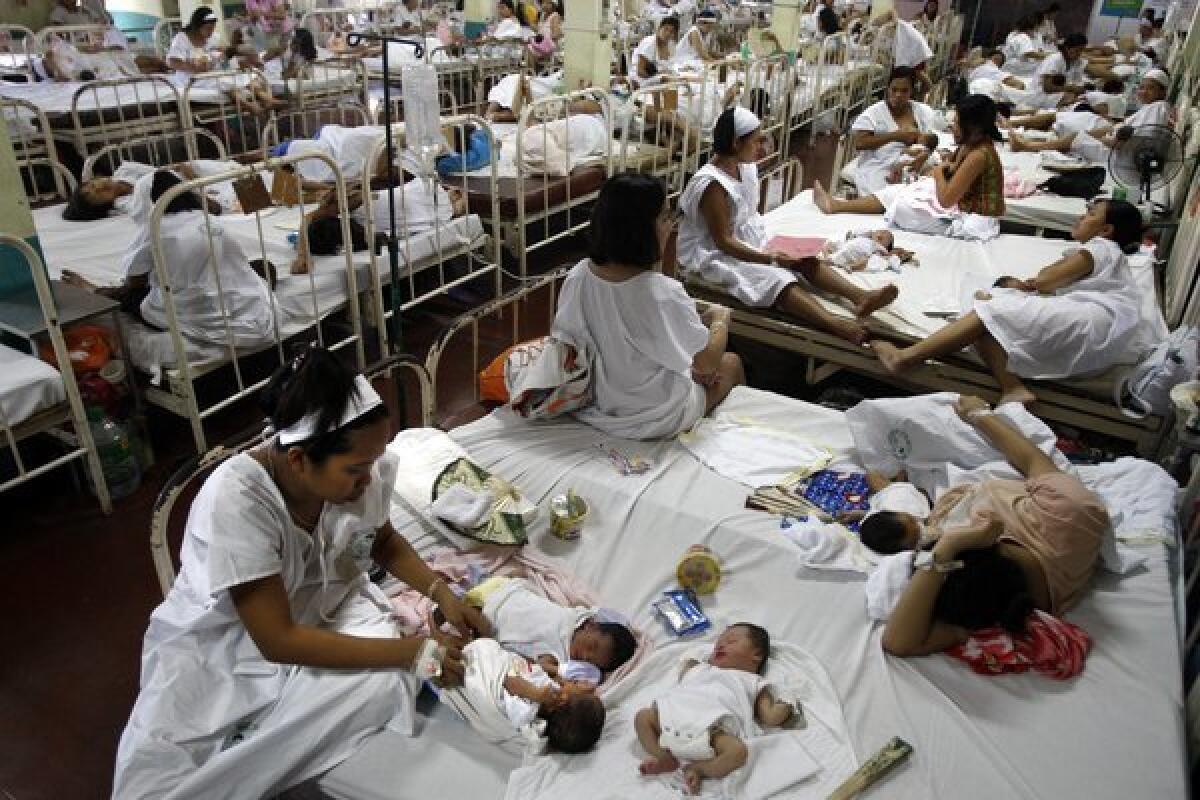Philippines president signs law easing access to contraceptives

MANILA — Philippines President Benigno Aquino III has signed legislation that will provide modern contraceptives to the nation’s poorest people and mandate sex education in public schools, a spokeswoman announced Saturday.
Leaders of the Roman Catholic Church in the Philippines immediately vowed to challenge the new law in the nation’s Supreme Court and rally demonstrations in the streets, alluding to the bishops’ role in inspiring the “People Power” revolution in 1986 that helped topple former President Ferdinand Marcos.
“The fight is far from over,” said Archbishop Ramon Arguelles, a vice chairman of Catholic Bishops’ Conference of the Philippines, in a radio interview Saturday. “The church will continue to protect and defend life. The church will not stop.”
The Responsible Parenthood and Reproductive Health Act was passed by the Philippines Congress this month after the bishops and their supporters had successfully blocked it for 14 years.
Access to birth control is a particularly acrimonious issue in the Philippines, which has the highest birthrates in Southeast Asia and millions of impoverished parents struggling to feed their large families. Half of all pregnancies are unintended and access to modern contraception is mostly limited to those who can afford it.
The bishops, who hold large sway in a nation that’s more than 80% Catholic, oppose birth control pills, condoms, IUDs and other forms of modern contraception, equating them with abortion or suggesting that they promote promiscuity. Instead, they sanction only Vatican-approved “natural” family planning, such as withdrawal or abstinence during a woman’s fertile periods.
Yet the people in the Philippines have been edging away from the Catholic hierarchy on such personal matters, following the path of Catholics in Europe and the Americas. For the last decade, polls have shown that 70% of Filipinos support the reproductive health bill that will take effect in January.
Aquino signed the bill without public ceremony just before Christmas so as to not antagonize Catholic leaders. One leader of the Bishops’ Conference threatened to excommunicate the president if he signed the bill. Arguelles previously compared Aquino’s endorsement to an act worse than the gunman who killed 20 children in Newtown, Conn., school shooting.
On Saturday, the Aquino spokeswoman said the new law “closes a highly divisive chapter of our history” and reached out to Catholic leaders and their supporters for cooperation and reconciliation.
“This is the mark of a true democracy,” Abigail Valte wrote in a statement issued by the presidential palace.
The new law, among other measures, would overturn Manila’s de facto ban on contraceptives in its public health clinics. The Los Angeles Times in July published a series, “Beyond 7 billion” chronicling the lives of poor women who scramble every day to care for many more children than they planned to have.
Government surveys show that 39% of married women in the Philippines want to postpone pregnancy or have no more children, but are not using modern contraception. Similar patterns exist across the developing world, where an estimated 222 million women want to avoid pregnancy but do not have access to effective contraceptives.
If they did, unplanned births would fall by two-thirds, as would the number of abortions, according to the U.N. Population Fund and the Guttmacher Institute, a New York think tank that supports universal access to contraceptives and safe abortion.
The Philippines, with a population of 96 million, is projected to reach 155 million people by mid-century, making it one of the 10 most-populous nations, according to the United Nations.
The new law, if carried out, should help reduce the country’s high rates of abortions and maternal deaths as well as alleviate poverty, said Melissa Upreti, Asia regional director of the New York-based Center for Reproductive Rights.
“The Philippines has a track record of introducing good laws and not implementing them,” Upreti said. A lengthy court fight, she said, “could delay the implementation of the new law leading to further denial of women’s rights with dangerous consequences for their health: more unplanned pregnancies, maternal deaths and unsafe abortions.”
ALSO:
Assad won’t go, says Russia’s foreign minister
French court throws out Hollande’s tax on rich
India’s leaders urge calm after rape victim dies
More to Read
Start your day right
Sign up for Essential California for news, features and recommendations from the L.A. Times and beyond in your inbox six days a week.
You may occasionally receive promotional content from the Los Angeles Times.





